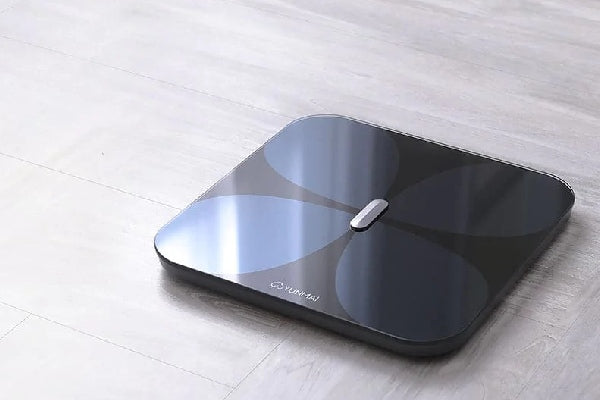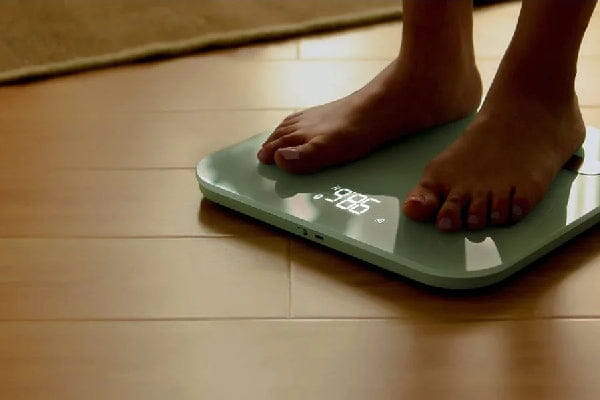
Smart Scale Buying Guide
Weighing in on a weekly basis is one of the most important parts of diet and fitness programs. Weighing in daily or weekly can keep you focused on your goals, and you'll have the added motivation of seeing your weight drop on the scale screen over the weeks, months and years. The only problem with weighing yourself weekly on a traditional scale is that you only see one number. And when you only look at your weight, you're not getting a complete, larger picture of your overall health. Smart scales are one of the latest additions to smart technology that aim to make it easier to maintain good health.
With a smart scale , you'll see that your body weight is only one piece of the puzzle when it comes to your health. Smart scales can measure a range of health metrics such as body fat, body mass index (BMI), standing heart rate, bone mass, and more.
Content
- What is a smart scale?
- The technology built into smart scales
- Powering a smart scale
- What do smart scales measure?
- Maximum weight capacity of smart scales
What is a smart scale?
A smart scale is a device for your bathroom that looks just like a traditional scale, but connects and communicates data with other devices. The main difference between a traditional scale and a smart scale is that the latter compiles more than one indicator of your overall health and shares that data so you can easily save it for future reference. Some scales can capture data like heart rate, bone density, and body mass index, then stream that data to your phone or tablet so you can see a history of your overall progress. In addition, many work in sync with fitness trackers and numerous health apps, thus offering additional functionality and benefits.
Why should you choose a smart scale?
Having a smart scale means you can keep a detailed history of your weight, body mass, muscle mass and heart health as it changes over time. Because smart scales use apps to track your health data, you can accumulate several years of health data just by stepping on the scale. Documenting your progress is a great motivator to keep exercising and sticking to a healthy diet.
Technology built into smart scales
Smart scales use embedded technologies designed to collect data from anyone who steps on them. This type of scale uses bioelectrical impedance analysis (BIA) to get your measurements. BIA involves passing a very weak, undetectable electrical current through your legs. The results are consistent and accurate and will give you an idea of your body condition on the day of the weigh-in.
Smart scales typically communicate with other devices via Wi-Fi and Bluetooth. For example, once you connect your scale to your home Wi-Fi network, it will use your home network to transmit data to your phone.
All your data will be logged in the compatible smart scale app and you can share this data with friends and family, with a health professional or sync it with other fitness apps. If you currently use a fitness tracker and app to track your health and fitness data, you may want to choose a smart scale from the same manufacturer and ensure full compatibility between your favorite app and your scale.
Powering a smart scale
Most smart scales use AAA batteries for power, but others will use Li-ion batteries for more power. Battery life will depend on how often you step on the scale.
What do smart scales measure?
Stepping on a smart scale will show you your weight, but it can also give you a more complete picture of your overall health. There are several different metrics that smart scales will measure for you.

1. Body fat
Your body is made up of muscle and fat, and when you lose weight, you don't always just lose body fat. The smart scale will let you know what your body fat index is right now and track your BMI over time so you can tell if you're actually losing fat when you might be losing water weight or muscle mass.
2. Body Mass Index (BMI)
Your body mass index is a good indicator of how healthy you are right now by incorporating your height and weight into a summary number that categorizes people as underweight, overweight, etc. A high BMI (usually over 24.9) can mean you have significant body fat, and it's an indicator to monitor even if you're not on a diet or exercise program. Because your weight and BMI increase with an unhealthy lifestyle, a high BMI can indicate the possibility of health problems in the future.
3. Muscle mass
If you work out every week, you're probably trying to lose weight. When you step on a traditional scale and see that your weight has increased, your first reaction may be to worry that you haven't been exercising enough. With a smart scale, you will be able to see if your weight has increased due to muscle mass gained during your strength training.
4. Bone mass
Smart scales can measure your bone mass. Low bone mass may mean you are at risk of osteoporosis. By measuring your bone mass, you will be able to find out if you need to adjust your diet, exercise or take vitamins to prevent further bone loss or reduce the likelihood of future problems arising from it.
5. Percentage of hydration
The amount of water you retain can affect the number you see on the scale, so knowing your hydration level is important when you weigh yourself. Your hydration level can also let you know if you are dehydrated and need to drink more fluids.
6. Heart rate and ECG
Knowing your resting heart rate is just as important as knowing your heart rate during exercise. A smart scale can measure your heart rate when you step on it, and tracking it over time can be a good indicator of your overall heart health.
7. Smart scales for tracking pregnancy and baby mode
Smart scales will track your family's growth and can adapt to different life stages. Some smart scales have a pregnancy tracker feature to keep track of how your weight is moving during this wonderful period. Some models also have a Baby Mode so you can monitor your baby's weight. All you have to do is step on the scale while holding your baby and it will read their weight.
8. Nutrition tracking
When you want a helping hand to manage what you eat and your calories, you can use your scale to track your daily food intake.
How many people will use the smart scale?

Having a smart scale means you can share your weight and other data with your friends and family, but you can also share the scale itself. You can set up multiple profiles within the compatible smart scale app, and every time your family members step on the scale, they'll get their own health data and assign it to their profile.
Compatible with top health and fitness apps.
Various types of smart scales will sync with fitness watches , including Apple Watch, Garmin, Fitbit, and Google Fit. Depending on which smart scale you choose, your scale may have real-time data syncing so that your weight is automatically uploaded to the various health and fitness apps you use.
Maximum weight capacity of a smart scale
A smart scale is similar to a traditional scale in that it has a maximum weight capacity. For most smart scales, this capacity is 400 pounds or 181 kg. Some scales may have a smaller capacity of approximately 330 pounds or 150 kg.. If you are interested in knowing the maximum capacity of a scale, check the manufacturer's specifications.
Take the next step
Along with diet, exercise and fitness tracking to keep you motivated, a smart scale can be a valuable tool for anyone looking to see a complete picture of their overall health. There are many types of smart scales with different functions that range from measuring heart rate, BMI, muscle mass and more. Now with this smart smart scale buying guide, you're ready to find the right one for you. Explore a wide selection of all types of smart at SmartX.bg !
Source: https://blog.bestbuy.ca/buying-guides/smart-scale-buying-guide
